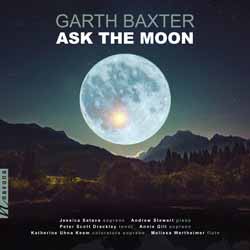|
Click here to return to the main site. Classical Music Review
Composer Garth Baxter delivers a collection of his works for voice entitled Ask the Moon. This album is inspired by the human condition and the pursuit of light in darkness. For those that usually think that the vocals in operatic/works for voice recordings get in the way of some enjoyable Classical music, Garth Baxter's Ask the Moon may make you reassess your point of view. It will certainly make you sit up and take notice. Over the course of these 19 tracks (45 min, 32 sec) we are taken on a journey to explore the human condition. A setting of Sara Teasdale’s 'Nights Without Sleep', for voice and piano commences the album’s journey of introspection. Then there is 'Three Madrigals' - 'There is a Lady Sweet and Kind', combines the elegance of the English art song with the character of a Stephen Foster folk tune; the performance of 'The Silver Swan', a dark Irish ballad of sorts, is evocative of the Leontyne Price recordings of Samuel Barber’s art songs; 'Love Me Not for Comely Grace', embodies its text, demonstrating the sweet, yet complicated burden of affections. Following is 'Is This the Cost?' an elegiac exemplar of Baxter’s flair for dramatic writing derived from Act II, Scene II of his opera Lily (Lisa VanAuken, librettist). 'Four Views of Love' begins with 'When You Are Old', a reflective setting of the classic Yeats text. Be prepared for an incredible climax that expresses fully the ranges of the piano and the human voice trailed by blissful catharsis. 'Let it Be You' and 'Let It be Forgotten', beckon the listener into the hollows of the heart, and are followed by a touching setting of Thomas Hardy’s A Thunderstorm in Town. 'Grandmother, Think Not I Forget', is a setting of a text Baxter co-wrote with his wife Katherine and is inspired by a Willa Cather poem. The music is honourable and commemorative. Next is 'Three Poems' from Edna St. Vincent Millay. 'Afternoon on a Hill' is an anthem for wistfulness - short, careful and delicate. 'Lament' is heavy in both text and composition. It depicts a woman in deep grief after losing her husband. She is merely going through the motions of life and tries to convince herself that life must go on. This song is dedicated to Katherine Keem, who is one of the vocalists on this CD. She loved the song but never had a chance to sing it before she died. 'Travel' is a song that is full of longing. Its deceptive simplicity holds an underlying message that speaks differently to each listener. To some it is nostalgic; to others it projects hope; and to still others, melancholy or adventure. 'Two Last Songs' begins with '1932', a narrator’s last memoir. It is in ternary form with the ending section taking on an almost recitative style by stretching out the phrases and reducing the accompaniment. The song ends abruptly, as life itself. 'When I am Dead, My Dearest', is the storyteller’s last plea to her lover - an invitation to sweet fondness in mourning, rather than sadness. Baxter revisits the poetry of Willa Cather with a setting of 'April Twilight', which Cather wrote in memory of her two brothers in their youth. This charismatic setting includes an accompanying melody for flute. Closing the album is 'Skywriting', a cycle drawing on words by Linda Pastan. Whether you ultimately become a fan of this album or not, one thing is certain, you'll certainly experience a unique musical journey. 8 Darren Rea Buy this item online
|
|---|


